Table of Contents
Scott Joplin The Entertainer with sheet music
Who Was Scott Joplin?
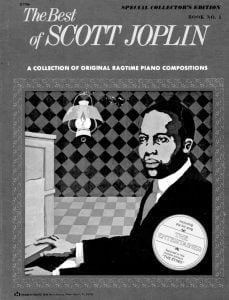
Born in the late 1860s somewhere along the border between Texas and Arkansas, Scott Joplin took up the piano as a child and eventually became a travelling musician as a teen. He immersed himself in the emerging musical form known as ragtime and became the genre’s foremost composer with tunes like “The Entertainer,” “Solace” and “The Maple Leaf Rag,” which is the biggest-selling ragtime song in history. Joplin also penned the operas Guest of Honor and Treemonisha. He died in New York City on April 1, 1917.
Musical Family
Scott Joplin’s exact date of birth and location is not known, though it is estimated that he was born between the summer of June 1867 and January 1868. Born to Florence Givens and Giles Joplin, Scott grew up in Texarkana, a town situated on the border between Texas and Arkansas.
Best Sheet Music download from our Library.
The Joplins were a musical family, with Florence being a singer and banjo player and Giles a violinist; Scott learned how to play the guitar at a young age and later took to the piano, displaying a gift for the instrument. Julius Weiss, a German music teacher who lived in Joplin’s hometown, gave the young pianist further instruction. Joplin was also a vocalist and would play the cornet as Joplin left home during his teen years and began work as a travelling musician, playing in bars and dance halls where new musical forms were featured that formed the basis of ragtime, which had distinct, syncopated rhythms and a fusion of musical sensibilities.
Joplin lived for a time in Sedalia, Missouri in the 1880s, and in 1893 he fronted a band in Chicago during the World Fair. He later settled in Sedalia again while continuing to travel, with the waltzes “Please Say You Will” and “A Picture of Her Face” becoming his first two published songs.
Please, subscribe to our Library.
If you are already a subscriber, please, check our NEW SCORES’ page every month for new sheet music. THANK YOU!
Writing Huge Hit: ‘Maple Leaf Rag’
Joplin studied music at Sedalia’s George R. Smith College for Negroes during the 1890s, and also worked as a teacher and mentor to other ragtime musicians. He published his first piano rag, “Original Rags,” in the late 1890s, but was made to share credit with another arranger. Joplin then worked with a lawyer to ensure that he would receive a one-cent royalty of every sheet-music copy sold of his next composition, “The Maple Leaf Rag.” In 1899, Joplin partnered with publisher John Stark to push the tune. Though sales were initially slight, it went on to become the biggest ragtime song ever, eventually selling more than a million copies.
Joplin focused on composing more ragtime works, with the genre taking the country by storm and Joplin earning acclaim for his artistry. Some of Joplin’s published compositions over the years included “The Entertainer,” “Peacherine Rag,” “Cleopha,” “The Chrysanthemum,” “The Ragtime Dance,” “Heliotrope Bouquet,” “Solace” and “Euphonic Sounds.
Opera Ambitions
Joplin was intensely concerned with making sure the genre received its proper due, taking note of the disparaging comments made by some white critics due to the music’s African American origins and radical form. As such, he published a 1908 series that broke down the complexities of ragtime form for students: The School of Ragtime: Six Exercises for Piano.
Joplin also aspired to produce long-form works. He published the ballet Rag Time Dance in 1902 and created his first opera, A Guest of Honor, for a Midwestern tour in 1903. The production was shut down due partially to the theft of box-office receipts, with Joplin ultimately dealing with great financial losses.
By 1907, Joplin had settled in New York to work on securing funding for another opera he had created, Treemonisha, a multi-genre theatrical project which told the story of a rural African-American community near Texarkana. A precursor to George Gershwin’s Porgy and Bess, Treemonisha was presented in 1915 as a scaled-down production with voice and piano, but would not receive a full-stage treatment for years to come.
Final Years and Legacy
Joplin continued to work on various musical forms and formed his own publishing company with his third wife, Lottie, in 1913. By 1916, he had started to succumb to the ravages of syphilis, which he was thought to have contracted years earlier, and was later hospitalized and institutionalized. Joplin died on April 1, 1917.
Ragtime would enjoy a resurgence during the 1940s, and then in the ’70s became a hugely popular classical genre that also entered the U.S. consciousness via film—”The Entertainer” became the theme song for The Sting, starring Paul Newman and Robert Redford. Joplin’s Treemonisha was also fully staged in 1975 on Broadway. The following year, Joplin received a special posthumous Pulitzer Prize, honoring the man who shaped a genre that influenced decades of music.
“The Entertainer”
The Entertainer is a 1902 classic piano rag written by Scott Joplin. It was sold first as sheet music, and in the 1910s as piano rolls that would play on player pianos.The first recording was by blues and ragtime musicians the Blue Boys in 1928, played on mandolin and guitar.
As one of the classics of ragtime, it returned to international prominence as part of the ragtime revival in the 1970s, when it was used as the theme music for the 1973 Oscar-winning film The Sting. Composer and pianist Marvin Hamlisch’s adaptation reached #3 on the Billboard pop chart and spent a week at #1 on the easy listening chart in 1974. The Sting was set in the 1930s, a full generation after the end of ragtime’s mainstream popularity, thus giving the inaccurate impression that ragtime music was popular at that time.
The Recording Industry Association of America ranked it #10 on its ‘Songs of the Century’ list.
Browse in the Library:
| Artist or Composer / Score name | Cover | List of Contents |
|---|---|---|
| Beethoven – Moonlight Sonata | ||
| Beethoven – Moonlight Sonata 1st Mov. Guitar arr. with TABs |
 |
|
| Beethoven – Moonlight Sonata 1st Mov. Guitar arr. with TABs.mscz | ||
| Beethoven – Ode to joy – Piano arr. | Beethoven – Ode to joy – Piano arr. | |
| Beethoven – Ode To Joy (Piano solo arr.) |
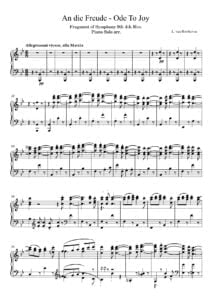 |
|
| Beethoven – Piano concerto 4 (Theme Easy piano solo) |
 |
|
| Beethoven – Piano Concerto 4 (Theme Easy Piano Solo) (Musescore File).mscz | ||
| Beethoven – Piano Concerto No 4 in G Op 58 (arr. for 2 pianos) | Beethoven – Piano Concerto No 4 | |
| Beethoven – Sonata No 23 Op 57 (Appassionata) Piano Solo (Musescore File).mscz | ||
| Beethoven – Sonata No. 8 Op. 13 Pathétique (Musescore File).mscz | ||
| Beethoven – Sonata Pathétique arr. for Guitar (Piano Sonata no. 8 in C minor op. 13 ) | Beethoven – Sonata Pathétique arr. for Guitar (Piano Sonata no. 8 in C minor op. 13 ) | |
| Beethoven – Sonata Pathétique arr. for Guitar (Piano Sonata no. 8 in C minor op. 13 ).mscz | ||
| Beethoven – Sonate Op 111 – Arietta (Liszt) |
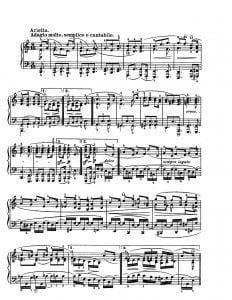 |
|
| Beethoven – Symphony n. 9 D 2H Pauer |
 |
|
| Beethoven – Symphony No. 5 (1st movement) Piano solo arr. |
 |
|
| Beethoven – Symphony No. 7 2nd Movement Piano Solo Arr. | Beethoven – Symphony No. 7 2nd Movement Piano Solo Arr. | |
| Beethoven – Symphony No. 9 3rd movement arr. for piano solo by Ernst Pauer | Beethoven – Symphony No. 9 3rd movement arr. for piano solo by Ernst Pauer | |
| Beethoven 2 cadenzas from Piano Concerto n 4 op 58 (arr. piano solo by Beethoven) | Beethoven 2 cadenzas from Piano Concerto n 4 | |
| BEETHOVEN ADAGIO from Piano Concerto Eb arr. piano solo |
 |
|
| Beethoven Analyse Pathetique | Beethoven Analyse Pathetique | |
| Beethoven by George Alexander Fischer (1905) Book |
 |
|
| Beethoven Duo For 2 Flutes Woo 26 (Musescore File).mscz | ||
| Beethoven Egmont Ouverture Piano solo Arr. Henselt |
 |
|
| Beethoven Egmont Overture Opus 84 Piano Solo arr. sheet music | Egmont Overture Opus 84 Beethoven 1st page | |
| Beethoven Fantasia G Minor Op.77 |
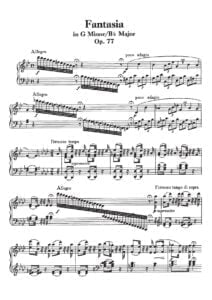 |
|
| Beethoven Fingerpicking For Guitar Solo with TABs |
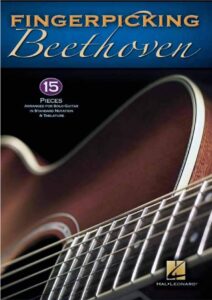 |
Beethoven Fingerpicking For Guitar Solo with TABs |
| Beethoven His Spiritual Development by J.W.N. Sullivan (Book) 1936 |
 |
|
| Beethoven L.V. Op 68 SYMPHONY VI arr. for 2 pianos |
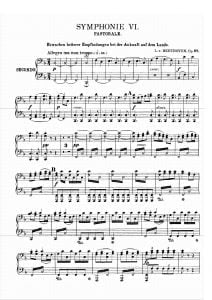 |
|
| Beethoven Leonore Overture No. 3 Piano Solo |
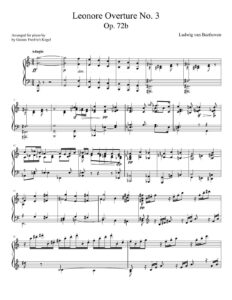 |
|
| Beethoven Leonore Overture No. 3 Piano Solo Musescore File.mscz | ||
| Beethoven Liszt 5th Symphony Piano Solo arr (Complete) |
 |
|
| Beethoven Liszt 5th Symphony Piano Solo arr.mscz | ||
| Beethoven Liszt – Symphony no. 9, 4th Movement Piano Solo arr. |
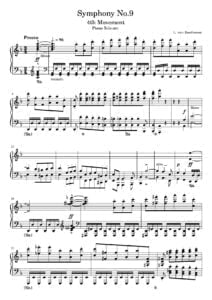 |
|
| Beethoven Liszt – Symphony No.9 4th Movement (Musescore File).mscz | ||
| Beethoven Liszt Marche Funebre |
 |
|
| Beethoven Liszt Symphony No. 9 – 1st Movement (S. 464) Piano Solo arr. | Beethoven_Liszt Symphony No. 9 – 1st Movement (S. 464) – Franz Liszt | |
| Beethoven Liszt Symphony No. 9 – 2nd Movement (S. 464) Piano Solo arr. | Beethoven_Liszt Symphony No. 9 – 2nd Movement (S. 464) – Franz Liszt | |
| Beethoven Moonlight Sonata 3rd Movement Guitar Tabs arr. | Beethoven Moonlight Sonata 3rd Movement Guitar Tabs arr. cover | |
| Beethoven Pastoral Symphony (piano reduction) | Beethoven Pastoral Symphony (piano reduction) | |
| Beethoven Piano Book 10 Musical selections (easy piano) |
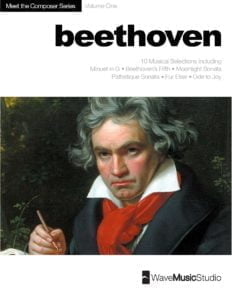 |
Beethoven Piano Book 10 Musical selections |
| Beethoven Piano Concerto 5 Piano Solo Reduction |
 |
|
| Beethoven Piano Concerto No 4 1st Movement (Arr For 2 Pianos) (Musescore File).mscz | ||
| Beethoven Piano Concerto No 4 3rd Mvmt (Arr For 2 Pianos) (Musescore File).mscz | ||
| Beethoven Piano Concerto No 4 Op 58 Piano Solo Reduction |
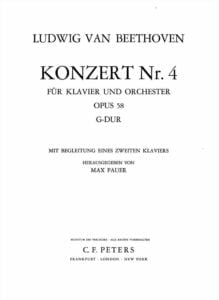 |
|
| Beethoven Piano Concerto No 5 (1st Movement) Arr For 2 Pianos (Musescore File).mscz | ||
| Beethoven Piano Concerto No 5 2nd Movement Fragment (Piano Solo) (Musescore File).mscz | ||
| Beethoven Piano Concerto No. 4 1st Movement Arr. For 2 Pianos.mscz | ||
| Beethoven Piano Concerto No. 4 3rd Movement Arr. For 2 Pianos.mscz | ||
| Beethoven Piano Sonata No.17 “tempest” 1st Movt. (Musescore File).mscz | ||
| Beethoven Sonata Op 49 No 2 (Musescore File).mscz | ||
| Beethoven Sonate No 8 “pathétique” Op. 13 1st Movement (Musescore File).mscz | ||
| Beethoven Symphony n.6 F 2H Pauer | ||
| Beethoven Symphony No 5 (1st Movement) Piano Solo (Musescore File).mscz | ||
| Beethoven Symphony No 6 Pastoral (1st Movement) Piano Solo (Musescore File).mscz | ||
| Beethoven Symphony No 6 Pastoral (3rd Movement) Piano Solo (Musescore File).mscz | ||
| Beethoven Symphony No 6 Pastoral (4th Movement) Piano Solo (Musescore File).mscz | ||
| Beethoven Symphony No 6 Pastoral (5th Movement) Piano Solo(1) (Musescore File).mscz | ||
| Beethoven Symphony No 7 (2nd Movement) Piano Solo (Musescore File).mscz | ||
| Beethoven Symphony No 9 (1st Movement) Piano Solo (Musescore File).mscz | ||
| Beethoven Symphony No 9 (2nd Movement-Scherzo) Piano Solo (Musescore File).mscz | ||
| Beethoven Symphony No. 5 (1st Movement) Piano Solo (Musescore File).mscz | ||
| Beethoven Symphony No. 6 Pastoral (2nd Movement) Piano Solo (Musescore File).mscz | ||
| Beethoven Symphony No. 6 Pastoral 2nd Movement (Musescore File).mscz | ||
| Beethoven Symphony No. 7 2nd Movement Piano Solo Arr. (Musescore File).mscz | ||
| Beethoven Symphony No.6 Op.68 piano solo arr. by Liszt |
 |
|
| BEETHOVEN The Complete Variations For Piano Solo |
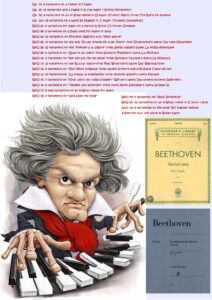 |
BEETHOVEN The Complete Variations For Piano Solo_compressed |
| Beethoven Variations and Fugue in E-flat major (Eroica Variations) Op. 35.mscz | ||
| Beethoven Virus Jazz |
 |
|
| Beethoven_Liszt Symphony No. 9 – 1st Movement (S. 464) – Franz Liszt Piano Solo arr.mscz | ||
| Beethoven_Liszt Symphony No. 9 – 2nd Movement (S. 464) – Franz Liszt Piano Solo arr.mscz | ||
| Beethoven_Symphony_No._9_3rd_movement_for_piano_solo.mscz | ||
| Beethoven- Liszt Symphony no. 6 Pastorale piano solo arr. |
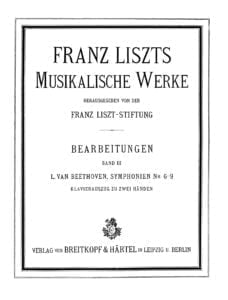 |
|
| Beethoven-Liszt Symphony 9 Choral (arr. for piano) |
 |
|
| Beethoven-Ludwig-van – Sonaten alle complete Band 1 (1-15) |
 |
|
| Beethoven-Ludwig-Van – Sonaten Alle Complete Band 2 (16-32) |
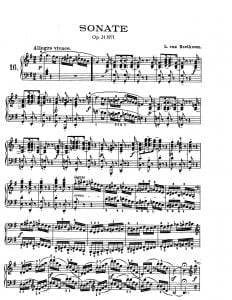 |
|
| Beethoven-Moszkowski – Emperor piano solo Transcription |
 |
|
| Beethoven’s 32 Piano Sonatas A Handbook For Performers (BOOK) |
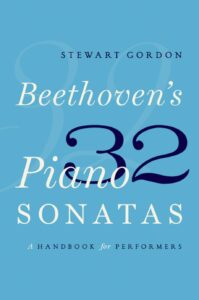 |
|
| Beethoven’s Arrangements For Solo Piano Of The 9 Symphonies By E. Pauer |
 |
|
| Beethoven’s Last Piano Sonatas, Piano Sonata In A Major, Op. 101 An Edition With Elucidation, Volume 4 |
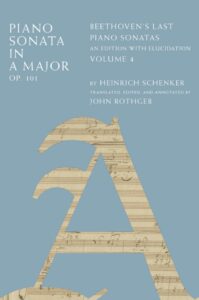 |
|
| Beethoven’s Last Piano Sonatas, Piano Sonata In E Major, Op. 109 An Edition With Elucidation, Volume 1 |
 |
|
| Beetlejuice – Obituaries – Danny Elfman | Beetlejuice – Obituaries – Danny Elfman | |
| Beetlejuice Theme – Danny Elfman |
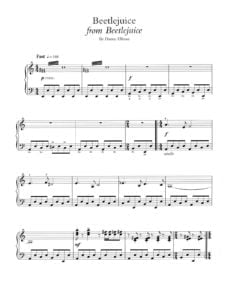 |
|
| Beetoven – Klaviersonate Nr. 14 Mondscheinsonate (Piano Sonata No. 14 Moonlight) 3rd Mov. (Musescore File).mscz | ||
| Beginning Gospel For Piano Easy Piano |
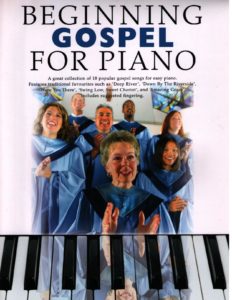 |
Beginning Gospel For Piano Easy Piano |
| Beginning Jazz Guitar The Complete Jazz Guitar Method by Jody Fisher (with audio MP3 audio tracks and Tablature) |
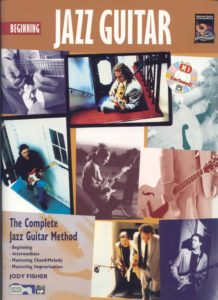 |
Beginning Jazz Guitar |
| Beginning Solo Guitar Merry Christmas with Tablature |
 |
Beginning Solo Guitar Merry Christmas |
| Béla Bartók Romanian Folk Dances Sz. 56 Piano Solo Sheet Music |
 |
|
| Bela Bartok – Music For Strings, Percussion And Celesta Sz. 106 (Piano Transcription) | Bela Bartok – Music For Strings, Percussion And Celesta Sz. 106 (Piano Transcription) | |
| Béla Bartók An Analysis Of His Music (Book) By Ernö Lendvai |
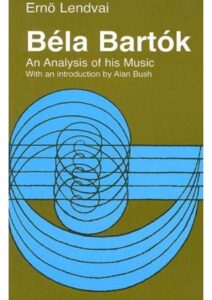 |
|
| Bella Ciao – As Performed In La Casa De Papel (Traditional Italian Anti-Fascist Song) (Musescore File).mscz | ||
| Bella Ciao (As performed in La Casa de Papel – Money Heist) Traditional Italian song (Anti-fascist) | Bella Ciao | |
| Bella Ciao Ukulele with Tablature TABs | Bella Ciao Ukulele with Tablature TABs | |
| Bella gioventù (Renato Zero) | ||
| Bella’s Lullaby (Carter Burwell) | ||
| Belle OST – A Million Miles Away by Rachel Portman |
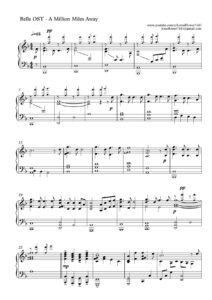 |
|
| Bellini Casta Diva (piano) | Bellini-CastaDiva | |
| Bellini – Casta diva (Norma) Easy Piano Solo arr. |
 |
|
| Bellini – Casta Diva (Norma) Easy Piano Solo Arr. (Musescore File).mscz | ||
| Bellini – Norma Casta Diva arr. piano solo |
 |
|
| Beltrami, Marco – The Giver – Rosemary’s Piano |
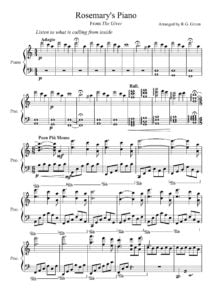 |
|
| Ben (Michael Jackson) | ||
| Ben E King – Stand By Me | ||
| Ben Folds – Annie Waits | ||
| Ben Folds – Brick | ||
| Ben Folds – Carrying Cathy | ||
| Ben Folds – Effington (Solo) |
 |
|
| Ben Folds – Fired | ||
| Ben Folds – Gone | ||
| Ben Folds – Losing Lisa | ||
| Ben Folds – Not The Same | ||
| Ben Folds – Rockin The Suburbs | ||
| Ben Folds – Still Fighting It | ||
| Ben Folds – The Luckiest | ||
| Ben Folds – Zak And Sara | ||
| Ben Harper – Fight For Your Mind (Songbook) (Ben Harper) Guitar TABs |
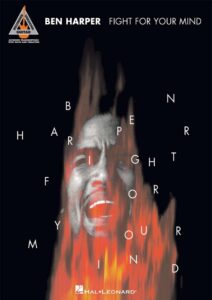 |
Ben Harper – Fight For Your Mind (Songbook) (Ben Harper) Guitar TABs |
| Ben Webster – Better Go The Quintet Studio Sessions |
 |
|
| Ben Webster – Solo on Solitude By Duke Ellington | Ben Webster – Solitude By Duke Ellington | |
| Ben Webster – Someone to Watch Over Me The Life and Music of Ben Webster (Jazz Perspectives) (Frank Buchmann-Moller) Book |
 |
|
| Ben Webster Stormy Weather – (solo Tenor Sax)I Cant Get Started | Ben Webster Stormy Weather – (solo Tenor Sax)I Cant Get Started | |
| Benjamin Waldmann Circles |
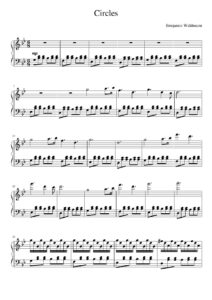 |
